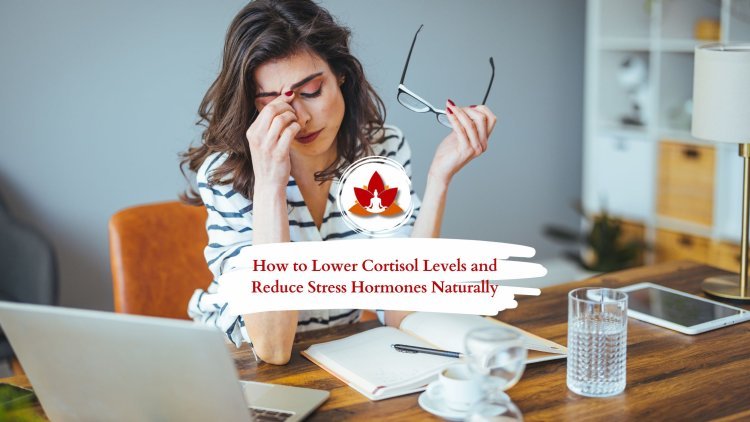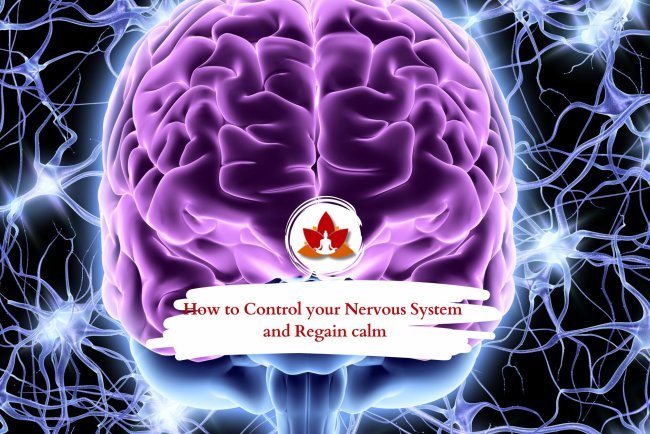How to Lower Cortisol Levels and Reduce Stress Hormones Naturally

Explore What Stress Really Is — and How to Naturally Lower Cortisol and Reduce Its Effects
Stress is a part of life, but how your body responds to it makes all the difference. When stress lingers, it can push cortisol—the body’s primary stress hormone—into overdrive. Elevated cortisol levels over time can leave you feeling wired, tired, and eventually burned out. But here’s the truth: cortisol isn’t the enemy—imbalance is.
If you’ve ever wondered how to lower cortisol, how to reduce stress hormones naturally, or whether a so-called “cortisol detox” really works, you’re in the right place.
Stress, in moderation, is actually natural—and sometimes even beneficial. We all feel pressure before a big deadline, anxiety before social events, or tension during times of change. But when that stress becomes chronic, the consequences can be far-reaching.
Beyond the emotional toll, chronic stress can disrupt your hormonal balance, particularly by elevating cortisol levels. While cortisol plays a vital role in energy regulation, immune response, and metabolism, too much for too long can wreak havoc on your physical and mental well-being.
The good news? You don’t need crash diets, gimmicky detoxes, or expensive supplements to bring your cortisol back into balance. With a few mindful, science-backed habits, you can support your body’s natural stress response and feel more grounded.
In this guide, we’ll explore:
-
What cortisol actually does in the body
-
How chronic stress impacts your hormones
-
7 natural ways to reduce stress and lower cortisol levels—gently and effectively
What is Stress?
Stress is the body’s natural response to challenges or threats. When you encounter a situation that feels overwhelming or dangerous, your body releases hormones like adrenaline and cortisol. These chemicals trigger the well-known “fight or flight” response—preparing your body to either confront the threat or escape it.
Acute Stress vs. Chronic Stress
Stress can be short-term (acute) or long-term (chronic), and each affects the body differently:
-
Acute Stress: This type of stress is brief and typically fades quickly. It arises from immediate challenges like a school exam, job interview, or public speaking event. Symptoms may include a rapid heartbeat, heightened alertness, and sharpened focus. Once the situation passes, so does the stress.
-
Chronic Stress: This occurs when stress continues for weeks, months, or even years. It often stems from ongoing issues such as a demanding job, long-term financial difficulties, or chronic illness. Over time, chronic stress can take a serious toll on both physical and mental health.
Common Causes of Stress
Here are some of the most typical stressors people face:
-
Work: Tight deadlines, job pressure, lack of control, or conflicts with colleagues and supervisors can create a high-stress environment. Feeling unfulfilled or overwhelmed in your role may lead to long-term work-related stress.
-
Relationships: Disagreements, poor communication, or emotional distance in relationships with family, friends, or romantic partners can create ongoing emotional strain.
-
Financial Concerns: Worries about debt, meeting monthly expenses, or securing a stable income are major sources of stress. Financial instability often feels inescapable, contributing to chronic anxiety.
-
Health Issues: Coping with chronic illness, injuries, or concerns about your own or a loved one’s health can significantly elevate stress levels.
What Are the Hormones Linked to Stress?
When you encounter stress, your body activates a complex system designed to help you respond—starting with the release of specific hormones. The three primary stress hormones are cortisol, adrenaline (epinephrine), and norepinephrine (noradrenaline). Each plays a vital role in activating your body’s “fight or flight” response.
1. Cortisol: The Master Stress Hormone
Often called the “stress hormone,” cortisol plays a central role in how your body handles stress. It:
-
Helps regulate blood sugar and metabolism
-
Suppresses non-essential functions like digestion and reproduction during emergencies
-
Manages mood, motivation, and fear
-
Reduces acute inflammation
While cortisol is essential in short bursts, consistently high levels due to chronic stress can lead to fatigue, sleep issues, weight gain, and weakened immunity.
2. Adrenaline (Epinephrine): The Quick-Reaction Hormone
Adrenaline is released almost instantly in response to stress. It:
-
Increases your heart rate
-
Elevates blood pressure
-
Boosts energy by increasing glucose levels in the bloodstream
This hormone prepares your body to move quickly and with heightened strength—ideal for sudden challenges or threats.
3. Norepinephrine (Noradrenaline): The Focus Booster
Norepinephrine, similar to adrenaline, also plays a critical role in your stress response. It:
-
Heightens alertness and concentration
-
Directs blood flow to muscles and essential organs
-
Enhances reaction speed and mental clarity
Together, these hormones ensure you're physically and mentally equipped to handle whatever challenge lies ahead.
How Does Cortisol Affect the Body?
Cortisol, often called the stress hormone, influences nearly every organ system in your body. It plays a crucial role in maintaining balance and managing several key functions:
1. Regulating the Body’s Stress Response
During stressful situations, cortisol is released shortly after the initial “fight or flight” hormones like adrenaline. It keeps your body on high alert by:
-
Sustaining your stress response
-
Triggering the release of glucose (sugar) from the liver to provide quick energy
This ensures your body remains ready to act in prolonged or ongoing challenges.
2. Managing Metabolism and Blood Sugar
Cortisol directly influences your metabolism—your body’s internal energy engine—by regulating how glucose is processed and used. It does this by:
-
Increasing glucagon (which raises blood sugar)
-
Decreasing insulin (which lowers blood sugar)
This helps ensure your brain and muscles have quick access to energy. Cortisol also affects glucose regulation in tissues like:
-
Adipose tissue (body fat)
-
Liver
-
Muscles
3. Suppressing and Modulating Inflammation
In the short term, cortisol has anti-inflammatory effects that help your immune system respond efficiently. However, chronically elevated cortisol levels can have the opposite effect:
-
Weakening immune function
-
Increasing inflammation over time
4. Regulating Blood Pressure
While the exact mechanisms aren't fully understood, cortisol plays a role in maintaining healthy blood pressure.
-
Too much cortisol can raise blood pressure
-
Too little cortisol may cause dangerously low blood pressure
5. Supporting Your Sleep-Wake Cycle
Cortisol is closely linked to your circadian rhythm:
-
Highest in the morning, helping you wake up
-
Lowest at night, preparing your body for sleep
Disruption in cortisol rhythms—such as through stress or poor sleep habits—can negatively impact your sleep quality and energy levels.
How Does My Body Control Cortisol Levels?
Your body uses a complex feedback system to regulate cortisol levels, primarily involving the hypothalamus, pituitary gland, and adrenal glands—a network often referred to as the HPA axis.
Here’s how the process works:
-
When cortisol levels drop, the hypothalamus releases a hormone called corticotropin-releasing hormone (CRH).
-
CRH signals the pituitary gland to release adrenocorticotropic hormone (ACTH).
-
ACTH then prompts the adrenal glands (located on top of your kidneys) to produce and release cortisol into your bloodstream.
This feedback loop helps maintain hormonal balance. For healthy cortisol regulation, all three parts—the hypothalamus, pituitary gland, and adrenal glands—must function properly and remain in sync.
What Causes High Levels of Cortisol?
Persistently high levels of cortisol — a condition known as hypercortisolism — are most often associated with Cushing syndrome. Common causes include:
-
Prolonged use of corticosteroid medications, such as prednisone, prednisolone, or dexamethasone.
ACTH-producing tumors, usually located in the pituitary gland, which stimulate excess cortisol production. -
Adrenal gland tumors that directly cause overproduction of cortisol.
What Are the Symptoms of High Cortisol Levels?
Symptoms of elevated cortisol, often seen in Cushing syndrome, may include:
-
Weight gain, particularly in the face (moon face) and abdominal area.
-
Fatty deposits between the shoulder blades (buffalo hump).
-
Wide, purple stretch marks on the abdomen.
-
Muscle weakness, especially in the upper arms and thighs.
-
Elevated blood sugar, which may progress to Type 2 diabetes.
-
High blood pressure.
-
Excessive hair growth (hirsutism) in women.
-
Weakened bones (osteoporosis) and an increased risk of fractures.
What Causes Low Levels of Cortisol?
Low cortisol levels — a condition known as hypocortisolism — are typically due to adrenal insufficiency, which comes in two main types:
-
Primary adrenal insufficiency (Addison’s disease):
This occurs when the adrenal glands themselves are damaged and can't produce enough cortisol. Most often, it’s caused by an autoimmune response that attacks the adrenal glands. Other causes include severe infections or bleeding that affect adrenal tissue. -
Secondary adrenal insufficiency:
This happens when the pituitary gland fails to produce enough ACTH (adrenocorticotropic hormone), which is needed to stimulate cortisol production. Causes include: -
An underactive pituitary gland (hypopituitarism)
-
Pituitary tumors
-
Abruptly stopping long-term corticosteroid therapy
What Are the Symptoms of Low Cortisol Levels?
Common symptoms of adrenal insufficiency (low cortisol levels) include:
-
Fatigue
-
Unintentional weight loss
-
Loss of appetite
-
Low blood pressure
7 Natural Ways to Lower Cortisol and Reduce Stress
Small lifestyle changes can go a long way in managing stress and regulating cortisol levels. Here are seven evidence-based ways to help you feel more balanced and calm:
1. Get Quality Sleep
Poor sleep is closely linked to elevated cortisol. Aim for 7–9 hours of restful sleep each night by creating a consistent bedtime routine. Try calming activities like reading, stretching, or a warm bath before bed.
Maintain a regular sleep schedule—even on weekends—and keep your bedroom cool, dark, and quiet. Avoid screens at least an hour before bed to limit blue light exposure.
2. Practice Mindfulness
Mindfulness practices such as meditation, deep breathing, yoga, or tai chi help calm the nervous system and reduce cortisol.
Take 10–15 minutes daily to be present with your breath or surroundings. Even simple techniques like the 4–7–8 breathing method can bring relief during stressful moments.
3. Eat a Balanced Diet
A nutritious diet supports hormonal balance. Limit saturated fats and processed foods, and increase your intake of omega-3-rich foods like flaxseeds, walnuts, and fatty fish.
Include a variety of fruits, vegetables, lean proteins (like legumes or poultry), and complex carbs (like brown rice or oats). Keep caffeine to a moderate level, especially if it increases anxiety.
4. Move Your Body
Exercise helps regulate cortisol—but intensity matters. Gentle or moderate activities like walking, swimming, or biking are more effective at lowering stress hormones than intense workouts.
Aim for 30 minutes of moderate activity most days. Even small changes like taking the stairs or walking during breaks can make a big difference.
5. Stay Hydrated
Dehydration can increase cortisol. Make sure to drink plenty of water throughout the day. If plain water isn’t appealing, try herbal teas or eat water-rich foods like cucumbers and watermelon.
Use a reusable bottle or straw to remind yourself to drink more often.
6. Connect and Laugh More
Strong relationships and social support are powerful buffers against stress. Spend quality time with friends, family, or your community.
Make time for laughter—it helps lower cortisol and boost mood. Whether it’s laughing yoga, a funny movie, or a comedy show, finding joy is key.
7. Spend Time Outdoors
Nature has a calming effect and can reduce cortisol levels. Aim for regular walks in parks, green spaces, or along nature trails.
If outdoor access is limited, bring nature indoors with houseplants and calming natural sounds.
When Should You See a Healthcare Provider About Cortisol Levels?
If you're experiencing symptoms of Cushing syndrome (high cortisol) or adrenal insufficiency (low cortisol), it's important to consult your healthcare provider.
Even if you're not experiencing extreme symptoms, but feel constantly stressed or overwhelmed, talking to a medical professional can help. They may recommend lifestyle changes, stress management techniques, or medical tests to better understand your cortisol levels.
Conclusion
Cortisol is a vital hormone that plays a key role in how your body responds to stress, regulates metabolism, maintains energy, and more. While many lifestyle strategies—like getting quality sleep, eating a balanced diet, and staying active—can help keep your cortisol levels in check, sometimes imbalances are due to underlying health conditions.
If you notice persistent signs of high or low cortisol, don’t hesitate to reach out to your healthcare provider. With proper guidance, it's possible to restore balance and feel your best.
FAQs: How to Lower Cortisol Naturally
What foods reduce cortisol levels?
Foods high in vitamin C (like oranges, strawberries, bell peppers), magnesium (like nuts, seeds, leafy greens), and omega-3s (like salmon and mackerel) may help reduce cortisol. A balanced diet rich in whole foods supports hormone health.
Does magnesium help reduce cortisol?
Yes, magnesium may calm the nervous system and prevent cortisol overproduction. Good sources include spinach, almonds, pumpkin seeds, and whole grains. You can also consider supplements—just consult your doctor first.
How long does it take to lower cortisol levels naturally?
With consistent lifestyle changes—better sleep, regular exercise, mindfulness—many people notice improvements in a few weeks. The key is consistency and patience.
What is “cortisol face,” and can it be reversed?
“Cortisol face” refers to facial bloating or puffiness caused by prolonged high cortisol. It can often be improved by lowering stress, getting better sleep, and maintaining hydration and nutritional balance.
Can stress cause weight gain even with a healthy diet?
Yes. Chronic stress and elevated cortisol can cause abdominal weight gain, food cravings, and slowed metabolism, even if you eat well. Managing stress is essential for maintaining a healthy weight.
What are symptoms of high cortisol levels?
Symptoms may include:
-
Weight gain (especially around the belly)
-
High blood pressure
-
Muscle weakness
-
Mood swings or anxiety
-
Sleep disturbances
-
Digestive issues
-
Frequent colds or infections
What role does physical activity play in reducing stress?
Regular movement helps reduce cortisol in several ways:
-
Boosts mood via endorphins
-
Improves sleep quality
-
Enhances mental focus and clarity
-
Provides a healthy distraction
-
Reduces long-term stress response
Choose activities you enjoy—like yoga, dancing, jogging, or even brisk walking—for the best long-term results.
What's Your Reaction?


























